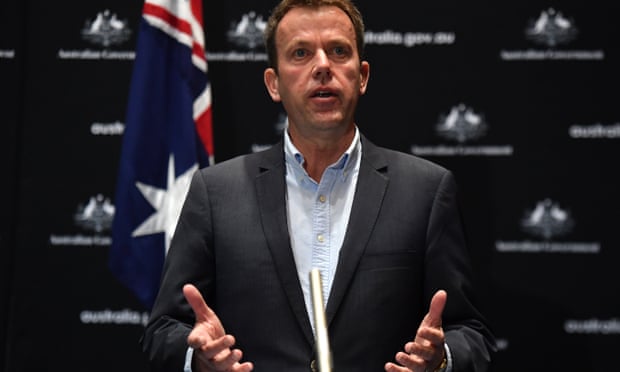Australian universities warn Covid-19 relief package not enough to stop 21,000 job losses
Sun 12 Apr 2020, 08:46:43

Universities have warned a federal government guarantee of existing funding levels won’t be enough to prevent 21,000 job cuts in the next six months, as crashing international student revenue hits Australia’s third-largest export sector.
On Sunday the education minister, Dan Tehan, announced the federal government will guarantee $18bn of funding to universities this year, even if their domestic enrolments drop, and provide $100m of regulatory fee relief to the tertiary education sector, including private vocational education and training.
Tehan told reporters in Canberra the funding guarantee would “provide ballast” to universities, which would also benefit from an extended eight-year window to repay HELP loans if they suffer an under-enrolment of students.
Frydenberg says easing coronavirus restrictions ahead of medical advice 'dangerous and unrealistic'
Read more
Universities have been calling for a more generous support package, as Labor warns some are on the verge of collapse and the federal government excluded the sector from the lower threshold offered to charities to access the $130bn jobkeeper wage subsidy.
The Universities Australia chair, Deborah Terry, welcomed the announcement as a “first step” but warned that even with the guarantee there will be a tough road ahead.
“We estimate a quarter of all jobs at Australian universities will go within the next six months – that’s more than 21,000 livelihoods,” she said.
“Without guaranteed [commonwealth grant scheme] and HELP funding that figure would have been even higher.
“Individual universities are already cutting costs across the board through very substantial reductions in operational spending, deferral of vital capital works, and reductions in senior staff salaries.”
“However, this will be nowhere near enough to cover what we conservatively estimate as a revenue decline of between $3bn and $4.6bn.”
Sign up for Guardian Australia’s daily coronavirus email newsletter
On Wednesday University of Sydney revealed to its staff it was expecting to lose $470m this year.
Advertisement
The Australian National Union chancellor, former foreign affairs minister Julie Bishop, told Guardian Australia that despite a
40% decline in its revenues ANU is likely to miss out on the jobkeeper program because its revenues exceed $1bn, at which point the higher 50% threshold applies.
40% decline in its revenues ANU is likely to miss out on the jobkeeper program because its revenues exceed $1bn, at which point the higher 50% threshold applies.
Tehan suggested universities could be beneficiaries of Australians out of work or stuck at home due to Covid-19 restrictions. He announced the government will “slash the prices of degrees and diplomas in short courses, to enable people, rather than bingeing on Netflix, to binge on studying”, including courses such as nurses and allied health.
“So we also want our universities to seize this opportunity … to become world leaders in short courses, world leaders in what is called micro-credentialing.”
Tehan said the support package was aimed at universities which had suffered a drop in domestic students, but there are ongoing discussions between the New South Wales government and universities in that state to provide “some type of financial loan” for those suffering from a drop in international students.
ANU to base admission on year 11 because of 'significant disruption' from coronavirus
Read more
Tehan thanked universities that had offered hardship payments to international students, including a $25m welfare fund from Deakin University, and said such schemes are on the agenda for the next education council meeting of state and territory ministers.
“We’ve asked officials to go away and look at what type of mechanisms could be put in place to help support international students through the coronavirus.”
Tehan noted the federal government had allowed second, third and fourth-year international students to access their superannuation and changed visa conditions to allow them to work more hours in frontline sectors including aged care and supermarkets.
Terry said universities will continue to seek low-interest loans from banks and state governments, which would “help reduce layoffs”, and maintain online teaching and research, but reiterated calls for more federal support.
“Many of our students are struggling to pay rent and buy food,” she said. “Universities are offering crisis support, but more will be required.
“Our universities and our students will play a vital role in national recovery. With government support, we hope to ride out this crisis and get to work on rebuilding.”
No Comments For This Post, Be first to write a Comment.
Most viewed from International
Most viewed from World
AIMIM News
Latest Urdu News
Most Viewed
May 26, 2020
Do you think Canada-India relations will improve under New PM Mark Carney?
Latest Videos View All
Like Us
Home
About Us
Advertise With Us
All Polls
Epaper Archives
Privacy Policy
Contact Us
Download Etemaad App
© 2025 Etemaad Daily News, All Rights Reserved.

.jpg)
.jpg)
.jpg)






.jpg)


.jpg)
.jpg)
.jpg)
.jpg)
.jpg)
.jpg)
.jpg)
.jpg)
.jpg)
.jpg)
.jpg)
.jpg)

















